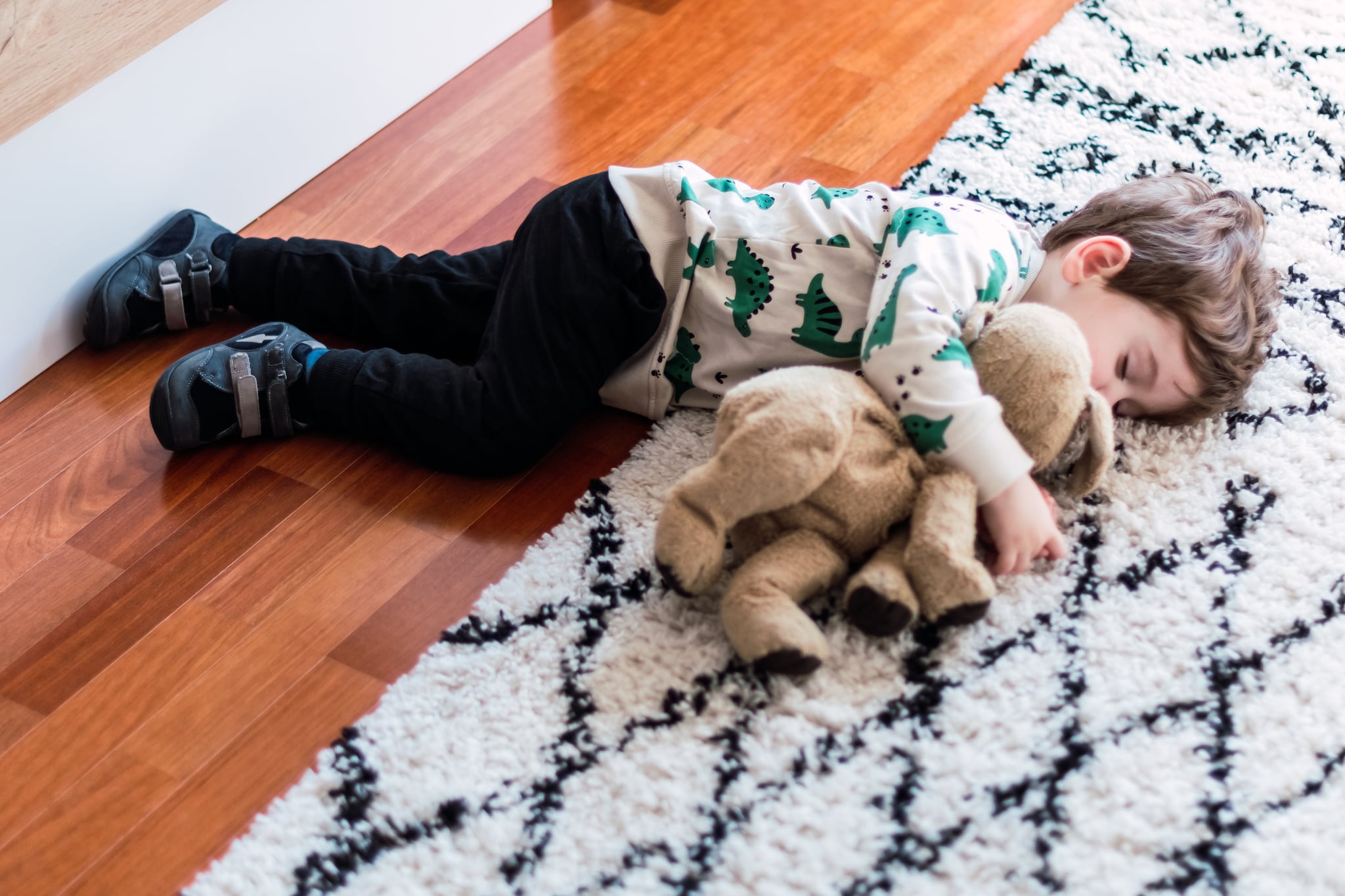Why Do Toddlers Sleep on the Floor?
My Toddler Started Sleeping on the Floor, So I Consulted the Experts — Here's What They Said

"Knock, knock, knock" my almost 2-year-old calls from his bedroom. Going to check, I find one of his little hands is knocking loudly while the other is reaching out from underneath the door. It's his latest tactic to get me to let him out of his room, where he spent the last hour drifting between asleep and awake — on the floor.
For the last six weeks, Liam has been fighting naps, getting out of his toddler bed repeatedly, and falling asleep on the cold carpet. I've tried putting him back to bed over and over. I've tried letting him cry it out. I tried rocking him to sleep. Nothing has made a difference in my stubborn second-born's nap habits! Luckily, he sleeps just fine at night (I have no idea why), but his naptime protests are really getting frustrating. To help discover why toddlers sometimes prefer sleeping on the floor, POPSUGAR talked to a psychologist and a certified pediatric sleep consultant to find out more.
Why Do Toddlers Sleep on the Floor?
When my oldest son was 2, he also slept on the floor at the beginning of every nap and bedtime. Usually, I could sneak in and move him to his bed with no more problems. My youngest, however, has a hard time falling and staying asleep. Sometimes he'll spend his entire nap period awake, or he'll doze off for just 15 or 20 minutes on the floor.
"When toddlers are first learning to self-soothe, it can take time for them to develop these skills without parent assistance," Stephanie Lee, PsyD at the Child Mind Institute told POPSUGAR. "If toddlers are refusing naps and/or engageing in escalated behaviour prior to the nap, it might take them even longer to self-soothe."
There may be other factors that contribute to toddlers wanting to sleep on the floor or fighting sleep on the floor. "Toddlers may sleep on the floor if they've been moved out of a crib too soon (i.e., before 3 years old), and if they're not clear about their parents' expectations, or are not confident in their ability to fall asleep independently," said Sierra Dante, certified pediatric sleep consultant at SweetSleepConsulting.com.
What Can I Do to Help When My Toddler Sleeps on the Floor?
Watching your child struggle with anything is absolutely heartbreaking as a parent. Especially when it's something as important as sleep. So, how can you get them to sleep in their beds instead of the floor?
"There are a lot of different ways to approach this, and it really depends on your family and bedtime routine," said Dr. Lee. "It may be helpful to try using rewards and/or requiring your child to sleep in their bed by doing your best to be consistent in returning them to their bed. I know it's tough, but often if you persist through a couple rough nights, your efforts are rewarded. You may also consider tracking when your child actually falls asleep at night and trying to set bedtime a little after this time in order to use their natural sleep cycle to your advantage. After a few nights of delayed bedtime success, you can try and start modifying bedtime back to an ideal time by 5- to 15-minute increments and while monitoring wake times."
How Important Are Routines to Sleep?
If your child isn't napping well because their bedtime sleep is thrown off (or vice versa) — the busy winter holidays and late nights definitely played a factor in my toddler's sleep habits — then experiment with different sleep and wake times to see what works for you. Then, stick to the same schedule every day.
"Sleeping is one of the most natural, easy, enjoyable things we do; if a child is struggling with naps and bedtime, timing can also be an issue," said Dante. "Children who sleep 11 to 12 hours at night (which is standard for babies, toddlers, and preschoolers) are ready to stop napping between 2.5 and 3.5 years of age. If a child is still napping or even getting too much sleep at naptime, this can cause bedtime disruptions. If sleep is not easy and enjoyable for a child, it can always be improved — just as with any other skill we help our children learn."
Dr. Lee added, "Toddlers can experience FOMO the same way adults do, and/or they may not want to stop the fun things they are doing before a nap or bedtime. Toddlers are still learning how to self-soothe, as discussed above, and it may be anxiety-provoking and/or uncomfortable for them when they are trying to fall asleep. Using a consistent bedtime/naptime routine can help a child with predictability and decrease some of this anxiety."
If you want to read more about this complicated (and frustrating!) topic, Dr. Lee highly recommends Good Night, Sweet Dreams, I Love You: Now Get Into Bed and Go To Sleep by Patrick Friman.
Talking to my friends, I learned that my son's behaviour is actually a common problem. Whether it's due to teething, newfound independence, schedule changes, a 2-year-old sleep regression, or just being overtired, toddlers have a lot going on, and it's normal for them to fight sleep sometimes. I'm planning on buckling down on our family's schedule again, gently soothing my toddler at naptime, and returning him back to bed as often as it takes. Feeling anxious or stressed isn't a reason to have to sleep on the floor (or else I would be doing it every night!), so I'm going to give my toddler the grace he needs, reinforce structure and routine back into his life, and make an extra cup of coffee.







